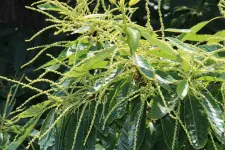New insight into photosynthesis could help grow more resilient plants
New model helps scientists understand how plants store energy in the thylakoid membrane
2021-06-29
(Press-News.org) PULLMAN, Wash. - A research team led by Washington State University has created a computer model to understand how plants store energy in the thylakoid membrane, a key structure to photosynthesis in plant leaves.
The team confirmed the accuracy of the mathematical model with lab experiments. Their work was recently published in the journal Nature Plants.
"We provided an important piece to the overall puzzle of plant metabolism," said Helmut Kirchhoff, a professor in WSU's Institute of Biological Chemistry and leader of the team who made this discovery. "If we integrate our model into the bigger picture, it may provide a good path for how to improve plants for certain environments."
Plants convert sunlight into usable energy through photosynthesis, but constantly adjust where and how they store the self-made energy based on light level, temperature, moisture and other factors.
Figuring out how plants make these adjustments could improve our understanding of how they perform in the field and help develop new plants that can withstand rising temperatures from climate change.
Kirchhoff and his collaborators' findings could have broad implications and benefits in years to come, as their model is integrated with others to learn more about how exactly photosynthesis works.
Energy conversion from sunlight and energy storage happens in specialized thylakoid membranes in chloroplasts in leaves.
"It functions like a battery," Kirchhoff said. "In leaves, plants pump protons from one side of the thylakoid membrane to the other generating a gradient of positive and negative charges."
To regulate this energy storage, ion channels control the fluctuation in amount of energy available, he said.
Understanding this complex process could be the key to feeding people around the world on a warming planet.
"Photosynthesis is very powerful," Kirchhoff said. "If it's not controlled, it can produce too much energy, which creates dangerous molecules that can kill a plant. Engineering plants with better photosynthetic control would mean those plants could survive in sunnier, warmer conditions."
The scientists shined a variety of lights on leaves and measured the changes in absorption and fluorescence.
"We illuminate leaves with different light intensities to create excited states in pigments," Kirchhoff said. "The leaf then changes its absorption and fluorescence properties that we measure, telling us what is going on in the leaf."
INFORMATION:
Co-authors on the paper include Meng Li, Vaclav Svoboda and Hans-Henning Kunz from WSU, and Geoffry Davis and David Kramer from Michigan State University.
The work was mainly supported by a U.S. Department of Energy grant (DE-SC0017160).
ELSE PRESS RELEASES FROM THIS DATE:
2021-06-29
Two recent collaborative publications by CU Cancer Center members provide insights into how chronic inflammation can serve as a key factor in the development of leukemia and other blood cancers.
Eric Pietras, PhD, CU Cancer Center member and assistant professor in the CU School of Medicine Division of Hematology, and James DeGregori, PhD, deputy director of the CU Cancer Center and professor in the Department of Biochemistry and Molecular Genetics, were corresponding authors on both papers.
Both papers provide support for the theory of adaptive oncogenesis, which was developed by DeGregori. The theory stipulates that chronic inflammation (such ...
2021-06-29
AMES, Iowa - During the course of a criminal investigation, it is common for investigators to interview individuals who are exhausted and have had little sleep. While unavoidable in some cases, a new Iowa State University study found sleep disruption or deprivation may limit the amount of information provided during an interview.
The study, published in the academic journal SLEEP, is one of the first to look at how sleep affects behavior during interrogations or interviews. Zlatan Krizan, an ISU professor of psychology, says while beliefs about the impact of sleep on interrogation subjects have existed for decades, he and co-authors, ISU professor Christian Meissner and graduate student Anthony Miller, found little direct scientific evidence related to its effectiveness. Krizan ...
2021-06-28
A new national study finds that children in the United States with greater screen time usage at ages 9-10 are more likely to gain weight one year later.
The study, publishing in Pediatric Obesity on June 28, found that each additional hour spent on virtually all forms of screen time was associated with a higher body mass index (BMI) one year later. In particular, researchers found that each extra hour spent watching or streaming television, YouTube videos, video games, video chat, and texting led to a higher risk of weight gain one year later. At the start of the study, 33.7% of children were considered overweight ...
2021-06-28
Scientists isolated a molecule, extracted from the leaves of the European chestnut tree, with the power to neutralize dangerous, drug-resistant staph bacteria. Frontiers in Pharmacology published the finding, led by scientists at Emory University.
The researchers dubbed the molecule Castaneroxy A, after the genus of the European chestnut, Castanea. The use of chestnut leaves in traditional folk remedies in rural Italy inspired the research.
"We were able to isolate this molecule, new to science, that occurs only in very tiny quantities in the chestnut leaves," says Cassandra Quave, senior author of the paper and associate professor in Emory's Center for the Study of Human Health and the School of Medicine's ...
2021-06-28
COLUMBUS, Ohio -- Mountaintop glacier ice in the tropics of all four hemispheres covers significantly less area -- in one case as much as 93% less -- than it did just 50 years ago, a new study has found.
The study, published online recently in the journal Global and Planetary Change, found that a glacier near Puncak Jaya, in Papua New Guinea, lost about 93% of its ice over a 38-year period from 1980 to 2018. Between 1986 and 2017 the area covered by glaciers on top of Kilimanjaro in Africa decreased by nearly 71%.
The study is the first to combine NASA satellite imagery with data from ice cores drilled during field expeditions on tropical ...
2021-06-28
Cunjiang Yu, Bill D. Cook Associate Professor of Mechanical Engineering at the University of Houston, is reporting the development of a camera with a curvy, adaptable imaging sensor that could improve image quality in endoscopes, night-vision goggles, artificial compound eyes and fish-eye cameras.
"Existing curvy imagers are either flexible but not compatible with tunable focal surfaces, or stretchable but with low pixel density and pixel fill factors," reports Yu in Nature Electronics. "The new imager with kirigami design has a high pixel fill factor, before stretching, of 78% and can retain its optoelectronic performance while being biaxially stretched by 30%."
Modern digital camera systems using conventional rigid, flat imaging sensors require ...
2021-06-28
The world's human population is expanding, which means even more agricultural land will be needed to provide food for this growing population. However, choosing which areas to convert is difficult and depends on agricultural and environmental priorities, which can vary widely.
A study led by Princeton University illustrates this challenge by using several different approaches to solve the same puzzle: Given a target amount of food, where should new croplands be put to minimize environmental or biodiversity impacts?
The researchers used the country of Zambia as a case study given that it currently harbors a significant ...
2021-06-28
PHILADELPHA--Patients who had their wisdom teeth extracted had improved tasting abilities decades after having the surgery, a new Penn Medicine study published in the journal Chemical Senses found. The findings challenge the notion that removal of wisdom teeth, known as third molars, only has the potential for negative effects on taste, and represent one of the first studies to analyze the long-term effects of extraction on taste.
"Prior studies have only pointed to adverse effects on taste after extraction and it has been generally believed that those effects dissipate over time," said senior author Richard L. Doty, PhD, ...
2021-06-28
Annapolis, MD; June 28, 2021--Drones keep getting smaller and smaller, while their potential applications keep getting bigger and bigger. And now unmanned aircraft systems are taking on some of the world's biggest small problems: insect pests.
From crop-munching caterpillars to disease-transmitting mosquitoes, insects that threaten crops, ecosystems, and public health are increasingly being targeted with new pest-management strategies that deploy unmanned aircraft systems (UAS, or drones) for detection and control. And a variety of these applications are featured in a new special collection published this week in ...
2021-06-28
A new study has found baby coral reef fishes can outpace all other baby fishes in the ocean.
Lead author Adam Downie is a PhD candidate at the ARC Centre of Excellence for Coral Reef Studies at James Cook University (Coral CoE at JCU).
Mr Downie said when considering aquatic athletes, young coral reef fishes shine: they are some of the fastest babies, swimming around 15-40 body lengths per second.
As a comparison, herring babies swim up to two body lengths per second, and the fastest human in the water, Olympic gold medalist Michael Phelps, can only swim 1.4 body lengths ...
LAST 30 PRESS RELEASES:
[Press-News.org] New insight into photosynthesis could help grow more resilient plants
New model helps scientists understand how plants store energy in the thylakoid membrane






